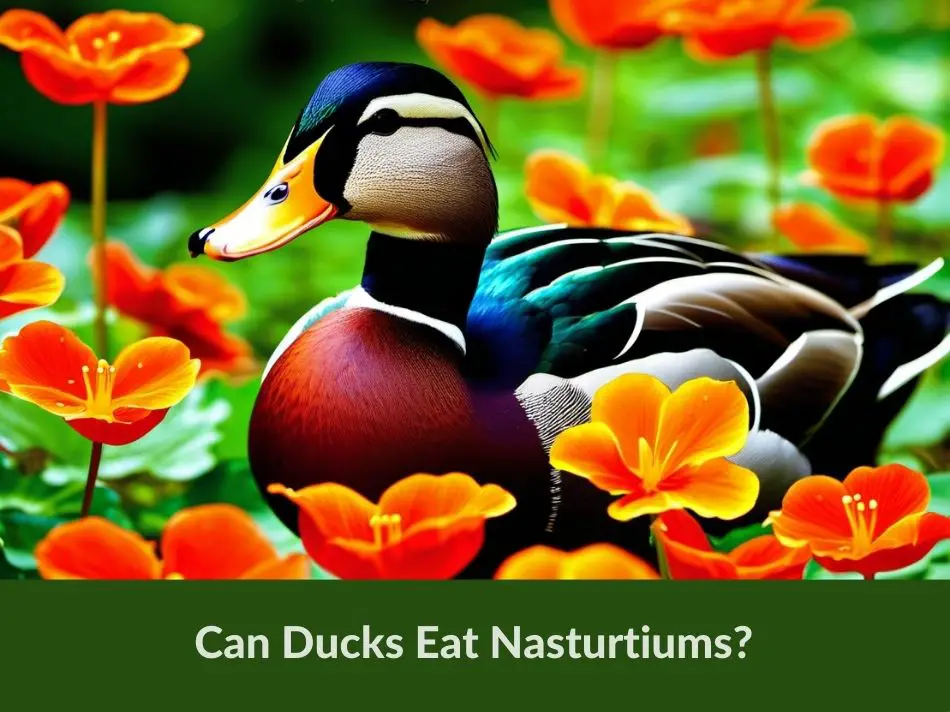Ducks are omnivorous birds that have a varied diet. In their natural habitats, they feast on a range of foods including small fish, insects, algae, and various plant materials. In urban settings, especially parks, ducks often rely on the food they receive from visitors and caretakers. But, can ducks eat nasturtiums?
Yes, ducks can indeed eat nasturtiums. The plant provides a natural source of vitamins and minerals, which can complement the nutritional intake of ducks, especially in urban settings where their natural diet might be limited.
n this piece, readers will gain insight into the dietary habits of ducks and understand the implications of feeding them nasturtiums.
What Are Nasturtiums?
Nasturtiums, belonging to the genus Tropaeolum, are a popular garden plant known for their vibrant flowers and rounded leaves. Aside from their ornamental value, they have also been consumed by humans for centuries due to their peppery taste and purported health benefits. The entire plant, including its flowers, leaves, and seeds, can be eaten.
Nutritional Value of Nasturtiums
Nasturtiums contain several essential vitamins and minerals. They are rich in vitamin C, a crucial antioxidant that can help in boosting the immune system. The plant also contains lutein, which is beneficial for eye health. Moreover, nasturtiums have high levels of iron, which aids in red blood cell formation.
Benefits for Ducks
- Natural Vitamins and Minerals: Feeding ducks with a diverse range of foods can mimic their natural diet in the wild. Including nasturtiums provides them with essential vitamins and minerals, which can contribute to overall health.
- Stimulates Natural Behavior: Ducks, like other poultry, enjoy foraging. Introducing nasturtiums, especially those growing in the garden or pond area, can encourage this natural behavior, ensuring that ducks remain active and engaged.
- Safe and Organic: When grown without pesticides or synthetic fertilizers, nasturtiums can be an organic food source. This means ducks are less likely to ingest harmful chemicals.
Potential Concerns
- Not a Complete Diet: While nasturtiums offer some nutritional benefits, they should not replace a balanced diet for ducks. Ducks still need a variety of foods to meet all their nutritional needs. Nasturtiums can be seen as a supplement, not a primary food source.
- Pesticides and Chemicals: If considering nasturtiums from outside sources, one should be cautious about where they come from. Plants sourced from areas where pesticides or chemicals are used can pose a risk to ducks.
- Digestibility: While most ducks can process plant matter effectively, individual ducks might react differently. It’s always a good idea to introduce any new food in small amounts and observe for any signs of digestive upset.
More Flowers Ducks Can Eat
Ducks, with their varied diet, often indulge in a variety of flowers when given the chance. Many flowers are not only safe but can also provide certain nutritional benefits to ducks.
Below are some more flowers ducks can eat:
Don’t forget to take a look at our detailed list of flowers and plants that are safe for ducks.
Conclusion
Nasturtiums, with their rich nutritional profile, can be a beneficial addition to a duck’s diet. They offer a natural source of essential vitamins and minerals and can be a delightful treat. But, as with any food source, it is crucial to consider the potential concerns, especially when sourcing the plants.
A varied and balanced diet, complemented by treats like nasturtiums, will contribute to a duck’s well-being and longevity.
Disclaimer: The information in this article is for informational purposes only. I'm not an expert or a veterinarian.


